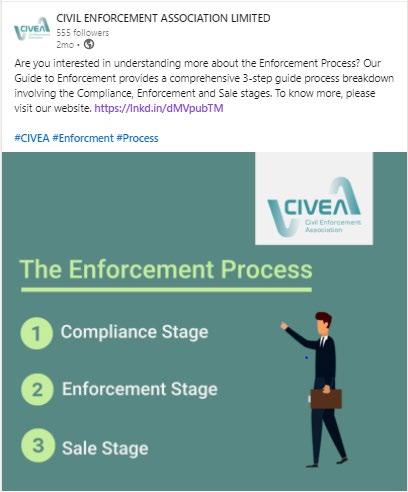








A summit to explore priority debt management and resolution. A line up of high calibre speakers from all sectors will share insight and best practice on how they are dealing with current challenges.


Chris Nichols’ first of a regular column for Enforcement News: a welcome opportunity to share Enforcement Conduct Board (ECB) news and developments. Starting with an update on the September launch of the ECB accreditation scheme. 15












Equita, Ross & Roberts and Stirling Park are beginning a new chapter with a renewed purpose and vision under new ownership. The three businesses each bring their unique experience, culture, and market position to form a new unit.
20
Frictionless payment experiences, powered by open banking are taking over and not because of the security benefits, but because the customer wants to use their mobile phone and banking app to pay for services and goods.

The take-off of direct to bank payments should not be ignored by enforcement





CIVEA CEO
Russell Hamblin-Boone
COUNCIL LIST
President:
Paul Whyte

Vice President:
Sarah Naylor
Treasurer:
Simon Jacobs
Immediate Past
President: Carole Kenney
Adrian Bates
Amy Collins
Terry Durant
Mike Garland
Deborah Hudson
Andrew Mackay
John Mason
Andy Rose
Martyn Shapter
Martin Stanford
Co-opted members:

Dave Burton
Jason Carter
Dave Chapman
Welcome to this year’s Autumn edition of Enforcement News.
The amount of unpaid council tax has reached £5.5 billion according to figures from the Department for Levelling Up, Housing, and Communities. The Centre for Social Justice (CSJ), which analysed the figures, said that council tax arrears have grown by £510 million in the year up to March 2023.
The head of debt at the CSJ said: “We don’t live in the 1990s anymore and the vast majority of people are perfectly willing to pay their council tax. Outdated regulation and overzealous use of bailiffs drives vulnerable families, who can’t afford their bills, into a debt spiral while worsening their issue with further fees.
“We need a new conversation about how we help vulnerable families out of debt. It is with targeted support and long-term repayment plans that the public purse can get the money it is owed, not aggressive collection.”
and designed to encourage early engagement to avoid increasing the overall debt someone owes. We heard recently that, following a detailed review using comprehensive evidence presented by CIVEA, the MOJ was recommending a small 5% fee increase to the statutory enforcement fees.

The Notice of Enforcement sent at the compliance stage explains how and when to pay, as well as the extra charges that could be applied if payment is not made. It gives at least seven days advance notice before a doorstep visit. The MOJ proposed to extend the Compliance Stage to 28 days for debts other than those owed by businesses.
The notice also includes contact details for the enforcement agency and options for free debt advice. Enforcement agents are trained and instructed to identify safeguarding or vulnerability needs and refer these cases to specialist welfare teams immediately. The MOJ is consulting on how to make people more aware of free debt advice and support.
Undoubtedly, the cost-of-living crisis is affecting the ability of some people to pay bills on time, including priority debt, such as mortgages, rent, utilities and council tax. CIVEA member firms are urging people in debt to respond to calls, emails and letters at the earliest opportunity. As recognised in the MOJ review of the fees regulations, enforcement firms are using multi-channel communication tools to maximise the chances of engagement; for example, sending more than one letter and text messages. Technological advancements have also meant better contact with debtors, including through reminders to pay and chasing late payments. Some firms have invested in solutions to enable debtors to speak to a chatbot, rather than an advisor, if preferred.
Council tax arrears is classed as a priority debt, along with mortgages, rent and utility bills. The CSJ report highlights council tax debt, but the costof-living is squeezing households on all priority debt. In our feature article, Muna Yassin, CEO of Rooted Finance, shares her organisations experience of indebtedness in London communities and how business and debt charities can work together.
Also in this issue, the Enforcement Conduct Board (ECB) has appointed a full team and has published its operational plan for the next 12 months. We have an update on its plans for industry oversight. CIVEA members are encouraged to apply for accreditation when the application window opens in late September. This demonstrates our ongoing commitment to ECB supervision.
WSA

1D South House, Bond Avenue, Bletchley, Milton Keynes MK1 1SW
Tel: 01908 371177
ADVERTISING / EDITORIAL
Email: enfnews@ wsacommunications.co.uk
Call: 01908 371177
We are always keen to have new contributors to Enforcement News, so please get in touch if you would like to write an article. If you have any comments about the magazine, we welcome feedback.
Russell Hamblin-Boone CEO, CIVEAThe government has published the outcome of its review of the fees that can be recovered from judgment debtors by enforcement agents (EAs) and High Court Enforcement when using the procedures in the Taking Control of Goods Regulations 2013 and the Taking Control of Goods (Fees) Regulations 2014 in England and Wales.
The review looked at whether the fees should be uplifted from the level set in 2014; whether more could be done to encourage payment without an enforcement visit becoming necessary; whether reform was needed of the High Court fee scale; and whether the costs of enforcement should continue to be borne by judgment debtors.
The following conclusions were announced.
Uplifting the fixed fees that enforcement agents and High Court Enforcement Officers (HCEOs) can recover from judgment debtors by 5%. This will be the first uplift to the fees since 2014.
Uplifting by 24% the thresholds above which enforcement agents and HCEOs can recover a percentage fee and rounding the result to the nearest £100.
The government will consult on a package of measures aimed at incentivising earlier and cheaper settlement of debt. Proposals include extending the minimum period of notice that must be given before making an enforcement visit from 7 to 28 days; defining in Regulations the tasks that are to be undertaken before a visit is made; and amending the statutory Notice of Enforcement to signpost debtors to advice and encourage early engagement with enforcement agents.
There will also be consultation on amending the Regulations that apply to High Court enforcement to prevent a higher fee being applied to low-value debts, and to clarify when cases can progress to the next enforcement stage.
The government will consult on proposals to amend the Taking Control of Goods: National Standards to prohibit creditors from seeking to recover a percentage of the enforcement agent or High Court Enforcement Officer fees when tendering for enforcement contracts.
Following consultation, we propose introducing legislation to implement all of these measures at the same time.
Following up on our reports to the Ministry of Justice about fraudulent activity and bogus enforcement agents, the government has published guidance to help protect people from scams.
Fraudsters have been phoning members of the public, posing as County Court bailiffs, High Court Enforcement Officers and Certificated Enforcement Agents. During the calls, the fraudsters claim that the person owes money, and demands that they transfer funds into a bank account.
Fraudulent activity is on the increase and it is in our interest to protect our industry’s reputation, as well as the public, by sharing this widely.
Written answers – Department for Work and Pensions: Universal Credit: Deductions
Jon Ashworth, Shadow Secretary of State (Department for Work and Pensions): To ask the Secretary of State for Work and Pensions, what was the total value of third-party Universal Credit (UC) deductions for (a) court fines, b) council tax arrears, c) water charges arrears, (d) gas or electricity charges arrears, (e) mortgage interest arrears and (f) owner-occupier service charge arrears in the 2022-23 financial year.
Guy Opperman, Minister of State (Department for Work and Pensions):
“Data on applications for UC deductions is not held. Data for deductions approved is provided in the table below.”
Table 1: Number and total amount of third-party debts registered against UC households between March 2022 and February 2023.
Mar-22 to Feb-23
For more news go to the CIVEA website https://www.civea.co.uk/news-andmedia
Richard Foord, Liberal Democrat spokesperson (Defence): The Child Maintenance Service (CMS) recently wrote to my constituent Deborah to confirm that the father of her children is in arrears by £47,000. Deborah recently heard that the bailiff is potentially unable to collect the debt and, if so, the money she is owed will be written off by the CMS. Can the Secretary of State explain why parents can be left with so little by the CMS when it gives up on collecting debts for parents who work so hard?
Mims Davies, The Parliamentary Under-Secretary of State (Department for Work and Pensions):
“The Government are supporting the private Member’s Bill that aims to streamline CMS enforcement processes. The CMS will not hesitate to use robust enforcement measures where someone is consistently refusing to meet their obligation towards their children. I am happy to look at that case and ask my colleague in the Lords to look at it.”
Just before the Houses of Parliament went into recess, the Ministry of Justice (MOJ) published its ‘Review of the Taking Control of Goods (Fees) Regulations 2014’.
On 12th December 2022, the MOJ published its response to a call for evidence in which it stated its intention to conduct a further review of the fees structure. A questionnaire was circulated with a deadline of 20th February 2023. A CIVEA working group was convened to provide a highly evidence and comprehensive response.
The extensive data collection exercise is probably the most complex that CIVEA has undertaken, made all the more challenging by the need to maintain absolute security for the confidential data. As a consequence, MOJ analysts have had access to data that allowed them to make an authoritative assessment of the industry and its viability following the pandemic.
CIVEA and its members have been pressing the government to act on its commitment, set out in the ‘Explanatory Memorandum’ to the fees regulations, to annually review the fees taking into consideration the Consumer Price Index.
The fees review questionnaire gathered information from industry and other stakeholders based on four themes:
• To see if more can be done to reduce the number of cases that result in a physical enforcement visit (theme A)
• To review whether the fees remain set at an appropriate level to adequately remunerate Enforcement Agents (EAs) for the activities undertaken at each enforcement stage (theme B)
• To review the fee recovered at Enforcement Stage 2 of the High Court fee scale (theme C)
• To review the impact of the Fees Regulations on creditors (theme D).
The MOJ has provided a detailed explanation of the review process and conclusions. Data provided by CIVEA and evidence from individual members has had a strong influence on the government policy proposals. The MOJ has held to its commitment to be evidence-based and its consultation response gives details of the reforms that have been led and implemented by the industry, as well as highlighting the development of standard practices. The paper indicates the impact of technology and how it is integral to the enforcement process.
There is a recognition of the efforts made by enforcement firms to engage and support people with problem debt, especially those with vulnerabilities.
• Uplift the fixed fees by 5% for both High Court and Non-High Court Fees
• Uplift the thresholds above which a percentage fee can be added to certain fees by 24% (rounded to the nearest £100), meaning that the threshold for non-High Court cases will be £1,900
• To amend the ‘Taking Control of Goods Regulations 2013’ to extend the minimum period of notice that must be given before EAs and High Court Enforcement Officers (HCEOs) move from the ‘Compliance Stage’ to the ‘Enforcement Stage’, from a minimum period of 7 days to 28 days for individual debtors, but not for debts owed by businesses
• To amend the ‘Taking Control of Goods Regulations 2013’ to set out the tasks that should be carried out as part of the ‘Compliance Stage’
• To amend the ‘Notice of Enforcement’ to signpost debtors to advice and encourage engagement with EAs
• To amend the National Standards to prohibit creditors from receiving extra payment of profit-sharing from the use of EAs and the charging of fees.
A 5% increase to each enforcement stage fee is much lower than the 24% applied to the threshold for additional charges for debts over £1,900. However, we welcome the government’s acknowledgement that the fee levels were not sufficient for the industry to be viable with the multitude of additional costs that have been absorbed by firms. The critical issue now is not to repeat the same mistake by failing to set in statute an annual review of enforcement fees. The government is not slow to review its own costs and HM Courts and Tribunals Service annually increases the court fees.
We do not want to delay the implementation of the new rates, but we will be seeking more detailed explanation for diminishing the fee increase with a higher threshold.
With regard to the other recommendations, we support the government’s intention to incentivise early engagement to keep down additional charges to an existing debt. It is common practice for local authorities and enforcement agencies to agree on extensions to the compliance stage, especially for council tax debts. A consistent approach to the compliance period gives clarity to debtors. In the case of Penalty Charge Notices, we often have insufficient details from the court to distinguish between private and commercial premises. Mistakes may occur unless we have clear guidance that recognises our best endeavours.
We welcome the proposal to revise the minimum tasks that should be carried out as part of the ‘Compliance Stage’. The National Standards do not reflect common practices adopted voluntarily by the industry. The challenge will be to allow flexibility for firms to innovate and compete in modern enforcement action by ensuring that only commonly applied measures are prescribed.
We also appreciate that the MOJ has recognised the increased incidents of creditors seeking rebates against the enforcement fees recovered. While it may shift creditors to seek additional rebates through social value measures, it provides a platform for the industry to challenge the principle of incurring costs that would diminish the new enforcement fee scale.

Following the conclusion of that consultation, the government intends to implement the uplifts and any reforms flowing from the consultation through secondary legislation by the end of 2023. It intends to bring forward all the legislative amendments at the same time.
The MOJ will need to act swiftly to publish a consultation paper and collate responses while drafting secondary legislation, to meet its deadline. We also need to factor in a lead time for system changes and other administrative adjustments.
CIVEA will be meeting regularly with officials to ensure that the new fees are implemented effectively and that a process is put in place to ensure the next review is timely and efficient.


With priority debt, such as mortgages, rent, council tax arrears and utility bills creating the highest levels of problem debt the summit will bring together representatives from the mortgage lenders, housing, utilities, enforcement and debt advice sectors to discuss responsible debt resolution. This is a unique opportunity for multi-sector engagement to bring its collective knowledge to challenge the cost-ofliving crisis
A line up of high calibre speakers from all sectors will share insight and best practice on how they are dealing with current challenges.



SAVE the DATE – The summit is a full day and is taking place on the 29th November 2023 at the prestigious Leeds Banqueting Hall , Civic Hall, Calverley Street, Leeds, West Yorkshire, LS1 1JF. The event is supported by Ascendant, MALG and CIVEA. More details to follow shortly.



According to the 2021 Census, 18% of the population in England and Wales belong to a black, Asian, mixed or other ethnic group. In London, this rises to 46%, while 41% of Londoners are born outside of the UK. For Manchester, this figure is 28.7% and is similar to other major cities across the UK.
Based on this level of diversity, there is no excuse for delivering services that are not representative, culturally appropriate or tailored to the needs of our diverse ethnic communities.
It is also commercially illogical.
At Rooted Finance, we see first-hand the additional barriers and systemic inequalities clients from minority groups face. We provide tailored and holistic debt and money advice services, working with diverse ethnic groups across London and the South East. Our specialist debt and money advice services have supported over 20,000 people since inception and managed over £76 million of problem debt.
Demand for our culturally appropriate and lived-experience centered services has never been higher or as needed.
We are currently facing the biggest cost-of-living crisis in a generation and the price of everyday essentials, like food and energy, are a huge burden on millions of households up and down the country.
This crisis is disproportionally affecting lower-income households, and we know from data that black and minority people are heavily over-represented in the lowest-income groups. In May 2022, the New Economics Foundation (NEF) published analysis which warned that black, Asian and other minority ethnic households would experience an average increase in the cost of living that was 1.6 times higher than their white counterparts.
pay £250 more for car insurance.
It is these further complexities that put diverse ethnic communities at greater risk of debt.
According to data from the Money and Pensions Service (MaPS) there has been a steep rise in the proportion of people from minority communities who need debt advice. Across the UK, they represented 30% of clients who accessed debt advice in 2022. We see this in action at Rooted Finance where 57% of our clients do not identify as white British: what we’ve been seeing firsthand, is now being replicated nationally.
And although the black population in London is 13.5% – last year black clients made up 32% of all MaPS-funded debt advice clients in London. A variance of 18.5%.
Minority communities also consistently have, on average, more debts and these debts are likely to be priority debts. Black and minority clients in London have more rent (51%) and council tax debt (47.9%) compared to all at 43% and 42% respectively.
The prevalence of priority debts amongst minority communities means they are statistically more likely to encounter enforcement agents (EAs) than their white counterparts. This is borne out in our data: to date, this year, nearly 15% of our clients at Rooted Finance have had some form of enforcement action.
This brings about a complex set of needs.
Understanding complexity
Clients accessing our debt advice services have other interlinked social welfare challenges (typically at least three linked to their debt cases) and this will also be true of vulnerable clients encountered by EAs.
Success for our service users means individuals having the support, information and advice to address their financial issues to avoid further financial hardship. The journey is different for everyone supported, and it is essential to tailor the advice and support provided.
The brutal reality is that minority ethnic households are experiencing much higher levels of fuel poverty, food insecurity and material deprivation.
A major factor for these economic inequalities is the Poverty Premium, whereby individuals on low or insecure incomes are often forced to pay more due to their circumstances – such as prepayment meters, higher-cost credit, or being unable to buy everyday goods such as food in bulk.
But systemic inequalities and racial disparities also play a significant role in the unequal impact of this cost-of-living crisis. Research by People Like Us found professionals from racially diverse backgrounds were paid just 84% of what their white counterparts earn. Pay disparity is just one example of the complex set of barriers faced by people from ethnic minority groups.
Another is what we’ve called the ‘Ethnicity Premium’. Through our work at Rooted Finance, and alongside partners, we have found that people from minority communities are faced with even more barriers and additional costs compared to their white counterparts.
The Ethnicity Premium sees clients from black and minority communities charged higher costs or denied access to products and services simply because of their ethnic background: some minority applicants are four times more likely to be denied a loan from their bank compared to their white counterparts. They also, on average,
Understanding these interlinked needs and barriers provides a good platform for service design, training and commissioning of services. Not taking these issues into consideration can breed adversarial dynamics, even if you intend to support people. Today, people rightly equate understanding and personalisation with good customer experience.
Language barriers, physical health issues and irregular income sources are all complexities that need to be understood and addressed. Gaps in systems knowledge, and how to navigate system failures are all contributing factors and working collaboratively with support services such as debt advice charities and other agencies means people can be supported to not only meet their financial commitments but also to prevent further fees and costs that worsen their financial wellbeing.
This lack of demonstrable understanding, coupled with the negative reputation of EAs (justified or otherwise) has a significant impact on why many people from minority ethnic groups believe that they are treated unfairly by the sector.
One recent case comes to mind. We’ll call her Anita to protect her identity.
The enforcement agent in this case arrived at 6am and understandably, the family was startled. He was there to enforce an unpaid parking ticket that Anita was challenging with the Council. Anita is disabled, and her car which the agent came to remove, clearly had her blue badge displayed. Anita tried to explain her situation to the agent and told him she relied on the car for hospital appointments; one of which she had that afternoon –but the agent dismissed her and proceeded to clamp the car and
“ With complex needs and systemic barriers at the heart of supporting diverse ethnic communities effectively, it goes without saying that one organisation can’t provide all the solutions.”
arrange for its removal. Anita is a native English speaker and knew that her disability meant her vulnerability should be considered. Her experience left her feeling discriminated against. To compound the experience, the agent left documentation that was meant to be hand-delivered in the foyer of her building for all her neighbours to see.
“The enforcement agent was ruthless. He didn’t take into consideration my wellbeing and was intimidating me with information that was inaccurate. I was left feeling really distraught by the way I was spoken to and treated. Imagine if I hadn’t known my rights,” said Anita.

Not all agents behave in this way, but the damage this does to reputations and perceptions can be corrosive and counterproductive.
To support and engage with diverse ethnic communities better, we have to be honest about perceptions and misconceptions on both sides.
With complex needs and systemic barriers at the heart of supporting diverse ethnic communities effectively, it goes without saying that one organisation can’t provide all the solutions.
Working in partnership to tackle these issues is essential. At Rooted Finance we work with a number of organisations and partners to provide the holistic and specialist support our clients need. We are also aware of our unique position as a communityembedded organisation and strive to share our insights and experiences through consultancy, training and insight projects. Training front-line staff of organisations is a big part of our efforts to improve the effectiveness of services for minority ethnic groups – and through these and other initiatives, we use our influence to ensure the experiences of communities are fair, equitable and transparent.
Of course, more funding for community-embedded debt and money advice organisations is needed, but setting up innovative referral partnerships, procuring insight training and developing stronger relationships with trusted organisations will also help the enforcement sector improve and enhance its operational effectiveness and wider engagement.
This autumn we launch our new project: The Financial Empowerment Alliance , which is focused on addressing systemic, cultural and structural barriers that prevent people from diverse ethnic communities from accessing financial products and services – including securing them at the same price as their white counterparts.
The project will also focus on increasing representation within financial services.
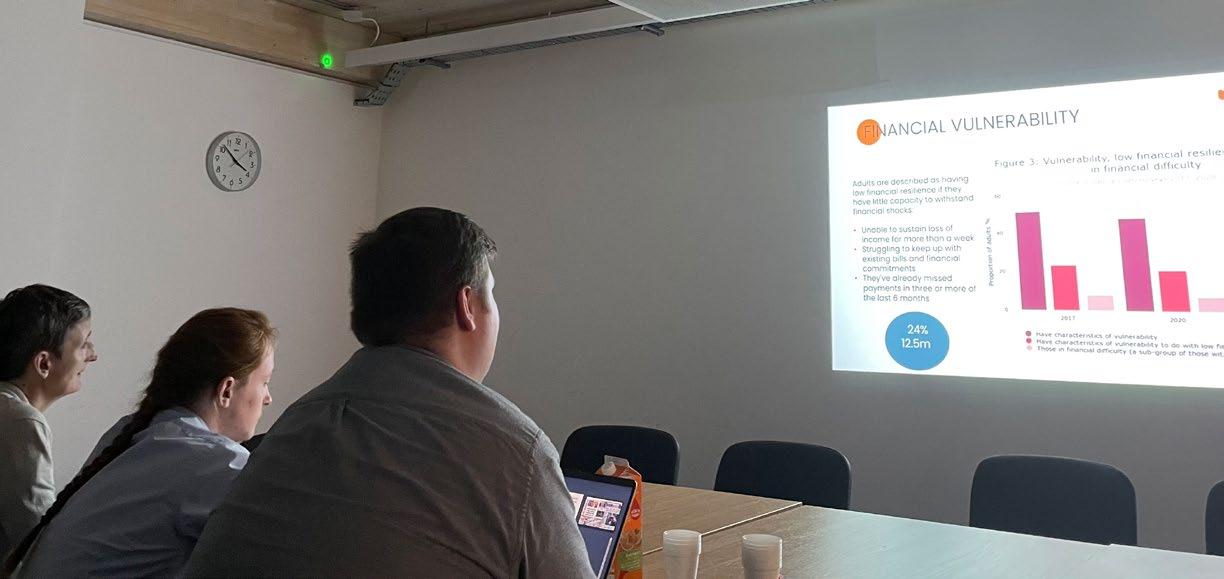

Representation within the enforcement sector should also be a priority; and recruitment and retention of a diverse workforce brings lived-experience and cultural awareness that no amount of training can substitute.
The Financial Empowerment Alliance is a strategic partnership and action-focused campaign. With partners we will specifically focus on building evidence of the unequal access to services for, and the ‘Ethnicity Premium’ paid by, people from diverse ethnic communities affected by financial exclusion.
We welcome organisations that want to know more or be involved.
muna@rootedfinance.org.uk
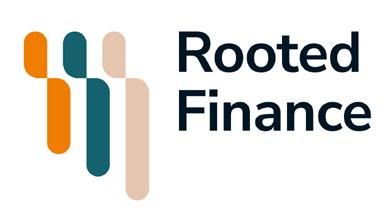 Muna Yassin MBE CEO, Rooted Finance
Muna Yassin MBE CEO, Rooted Finance

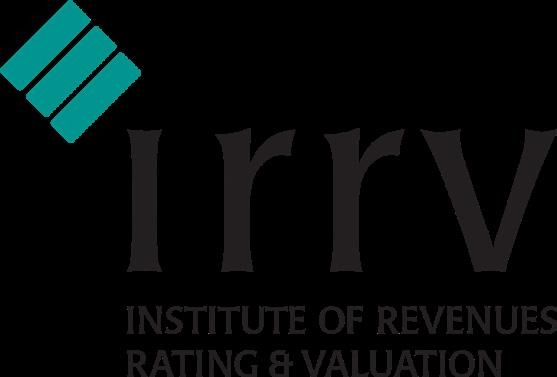


Local Authorities (LAs) have combinedly spent millions on nearly 200 schemes currently in operation with a further £10 million earmarked for further Traffic Reduction Schemes. With the best intentions, this has been done to create a ‘better’ environment, but the unintended consequences of this relatively new idea of shared streets are actually increased vehicle emissions due to frustrated drivers driving in circles trying to find their way in and out of the areas, Emergency Response Vehicles are being delayed and increased spending on expensive alterations or reversals of some of the completed schemes.

The aspiration to reduce air pollution by discouraging car use and getting people walking or cycling safely is not reaching the desired results first envisaged by the planners. These Low Traffic Neighbourhoods also have the double impact of School Zones, with no entry to any vehicles at designated times of the start and ending of the school day. The ANPR cameras that act as sentinels at the planter pot gates are subject to increased vandalism and are just moving the traffic to the outlying boundary roads thus causing extra congestion on the local main roads – some might conclude that it’s hardly fair on the drivers or the residents just outside of the schemes.
It is not all aimed at making life difficult for the driver, as some schemes allow residents to give their guests and any contractors open access to drive through the camera points without penalty, by registering the vehicles for singular daily use. Any other driver trying to attend addresses within these zones, however, will find it nearly impossible to drive the vehicle to the address without having to access locations via new routes. What should be a three minute direct journey covering less than a quarter mile can now be a 30-minute two mile diversion in congested traffic. Improved

signage indicating exit routes within the zones would lessen the impact of unnecessary aimless driving and the extra emissions that are created.
These restrictions were no doubt put in place with good intent, but as an enforcement agent, it makes it harder to collect warrants in borough as you cannot get close to the address where you wish to be without the risk of becoming an offender yourself! Assisting LAs and the Police on operations surrounding popular offence areas and trying to locate constant Persistent Evaders, is also being made difficult for the same reasons.
We all want our roads to be safer and less polluted, but the question has to be asked if we are doing the right things to reduce the number of vehicles in problem areas? At the time of writing, the Prime Minister, Rishi Sunak, has said he is on the side of drivers while ordering a review of Low Traffic Neighbourhoods. While this may seem encouraging with a government fully supporting Net Zero, he will have a conflict on his hands.

This is the first of my regular columns for Enforcement News: a welcome opportunity to share Enforcement Conduct Board (ECB) news and developments. And I start with an update on the September launch of our accreditation scheme.
The accreditation scheme is key to establishing effective oversight of enforcement work and it is through it that we will, in practice, create accountability.
The scheme offers enforcement firms an opportunity to make a public commitment to both accountability and high standards. It will also help creditors to drive good practice by ensuring that they only contract with accredited firms who have made an active commitment to ECB oversight.
Firms will apply annually and the framework and expectations will evolve over time, but for the first year, as set out in our business plan, firms will be required to commit to the following:
a) Treating the current Ministry of Justice National Standards as binding
b) Providing us with Quarterly Data Returns – we will consult on this later in the year
c) Providing information to us on request
d) Payment of the levy in a timely fashion – for most firms, payment of the levy for 2023/24 will be requested in October this year.
The accreditation framework will also set out how we will address breaches of these criteria, including some high-level sanctions. In year one, we won’t actively monitor or enforce compliance with the existing standards, or handle complaints, as we will be
developing our own standards and oversight model. However, we will have the ability to carry out reviews if we become aware of any serious issues that are likely to have a significant impact on citizens.
The year two criteria will evolve to reflect that from Summer 2024, we will be implementing our own standards and code of practice, as well as starting operational oversight and complaints handling. As we devise the full standards and criteria, we will be working with the technical expert groups that both CIVEA and the HCEOA helped us to set up. And the final criteria will be developed in consultation with stakeholders and published over the coming year.
Some of the criteria that we will be consulting on will include requirements for firms to sign up to the ECB’s standards; to accept our jurisdiction on complaints and to agree to periodic ECB monitoring audits.
Full details of the year one accreditation scheme and how to apply will be available on our website in early September. Please do sign up to our newsletter or follow us on social media (@ec_board) for updates on timings and further information.
I look forward to sharing further updates with you in my next column.
Until then!
Chris Nichols Chief Executive, ECB
Rundles is a leading provider of ethical enforcement services that works with you to design and deliver a fairer approach to debt resolution.

Our advantage builds on a long-established reputation for great service, fair resolutions and a one team approach. Resolve together. As one team.
rundles.org.uk
Equita, Ross & Roberts and Stirling Park have begun a fresh chapter with renewed purpose and vision. Under new ownership, possibilities stretch before us. As we shift gears and move into a phase of rapid innovation and development, many exciting long-term, prior-laid plans can now be executed.
With the support of our new owners, we are building on strong foundations and optimising the expertise, passion and commitment embodied by our teams.
Equita, Ross & Roberts and Stirling Park each bring their distinct culture and market position to form a new unit. Together, we move forward as a cohesive whole, while retaining the building blocks that have enabled our growth and 140-year heritage. Today, we are thought leaders in the treatment of vulnerable customers and progressive adopters of technology as we keep apace with the evershifting enforcement landscape.
Achievements under our own steam are notable:
• 2023 winners of the Credit Strategy Awards – Vulnerability Strategy

• Industry-leading for low complaints volumes
• Compelling results from our vulnerability self-declaration webform (putting agency in the hands of customers)
• Data-led and insights-driven customer service
• Consolidation of current market position, with new clients across core geographies.
This leads us to feel very optimistic about what we can now achieve with the financial backing and collaborative zest bought by our new investors.
Capricorn Capital Partners is a private equity firm specialising in collaborating with management teams to foster growth and establish long-term partnerships. Shackleton Group is a collection of South African companies operating in the insurance and credit management sectors.
Internally, the mood is upbeat. There is an undercurrent of new energy. The Senior Leadership Team (including new, key players) are poised to drive the group forward. A broad programme of technology investment with a focus on an intuitive, digital customer journey is already underway.
Our organisation is being infused with new life and purpose, fresh ideas and perspectives.
Building on the longevity and consistency that we represent for clients, we are refreshing our value proposition at virtually every client and customer touchpoint. It’s about striking a balance – the best of the old along with the vigour and progressive energy that comes with what’s new.
The future is bright for Equita, Ross & Roberts and Stirling Park. With the support of our new owners and management team, we are well-placed to consolidate our position as a major player in the dynamic and evolving enforcement market.

equita.co.uk

rossandroberts.co.uk
stirlingpark.co.uk
A new frontier
Under new ownership we have entered a new chapter, with renewed purpose and vision. The future is brightEmma Cowan CFO and Interim CEO, Equita, Ross & Roberts and Stirling Park



The Ministry of Justice (MOJ) has published its eagerly anticipated ‘Review of the Taking Control of Goods (Fees) Regulations 2014’ , with the headline news of a below-inflation fee increase of 5%. This recommendation likely reflects concerns as to the impact of any uplift on those who pay the fees, many of whom will be facing pressures on living costs.

In addition, the MOJ have confirmed they intend to consult on various proposals that aim to encourage engagement with enforcement agents and increase levels of settlement at compliance, but encouraging early-stage engagement and payment is nothing new. Over recent years enforcement companies have invested heavily in new technologies to drive a variety of innovative contact strategies. Significant progress has been made in this area as seen in the CIVEA data highlighted in the MOJ paper, which showed the proportion of cases that settled at the Compliance Stage rose from 28% in 2018 to 34% in 2022. Over the same period, the proportion of cases where no settlement was reached and no visit was made increased from 5% to 9%, reflecting better identification and return of vulnerable cases by companies prior to the enforcement visit.
There is only so much technology can achieve however, and in order to further increase levels of early-stage engagement and payment whilst protecting the vulnerable, a variety of new initiatives are being pursued by enforcement companies working together with their local authority clients.
By way of example, in a ground-breaking partnership initiative pursued by Thurrock Council and Hambury Tilmond, joint attendance is being made at Magistrates’ Court hearings to try to engage with repeat council tax debtors to break the cycle of debt. These have targeted debtors with previous arrears who have been notified in advance of assistance available from the enforcement agents. Those that have attended have been offered the chance to avoid their new case being passed for enforcement providing they enter into a longterm arrangement with Hambury Tilmond to pay their arrears. By engaging with these debtors at this point they can benefit from a reduction in costs, whilst Thurrock Council and Hambury Tilmond get to clear older ‘problem’ debts which have not been collected through standard enforcement.
In other partnership initiatives, enforcement companies around the country have set up debt surgeries together with their local authority clients to try to engage directly with those struggling with debt.

Given the continued focus on early-stage engagement/payment and the need to support and protect the vulnerable, there must be scope for enforcement companies and local authorities to work closer together in similar ways for the benefit of all parties!
Adrian Bates Senior Business Consultant,
We are a leading provider of Enforcement services, for the collection of Council Tax and NNDR cases, previously returned as uncollectable. Our audited collection rate exceed 20% on recycled Council Tax cases with zero upheld complaints, and we can provide a balanced and ethical solution to increasing your collection rates.
#1 Enforcement Agency (measured by value) for the collection of Council Tax and NNDR in over 90% of LA’s where more than one Enforcement Agency has been appointed.

We’re more than just ANPR. Increasing collection rates through intelligence and door step collections, recycled Warrant service available.
Southend on Sea, Essex, SS1 1PG 01702 436032 | info@hamburytilmond.co.uk
www.hamburytilmond.co.uk
Send your aged debt securely to Hambury Tilmond for a free/no obligation evaluation. We’ll cleanse, trace, contact append and financially profile your debt portfolio and provide a projected revenue report.
We have an audited collection rate in excess of 50%. If your HBOP and Sundry Debt is being collected as an ‘added value service’ it’s unlikely collections are being maximised, we have the solution.
Our agents are well trained, only work for Hambury Tilmond, and ethically renumerated, ensuring ethical collections are at the core of what we do. We are proud of our record of zero upheld complaints, and zero complaints to clients since 2018.
We enjoy a challenge, on a trial basis under a simple SLA you can appoint us to challenge your incumbent enforcement provider. We have a proven track record of outperforming incumbent providers with cases they have previously returned as ‘uncollectable’.

The United Nations (UN) defines digital inclusion as:








“Equitable, meaningful, and safe access to use, lead, and design of digital technologies, services, and associated opportunities for everyone, everywhere.”

The UN states that individuals’ specific digital needs must be taken into consideration so as not to leave anyone behind. Achieving this requires affordable access to digital skills and tools, where they can participate equitably in safe, discrimination-free online spaces.
The UN also stresses the importance of actively engaging with the people who will use digital processes, especially those from marginalised communities. If we want people to embrace new technologies, they need to see them as inclusive, useful and trustworthy.
While the enforcement process usually begins with the Notice of Enforcement, a physical document, being posted, there are a variety of digital communication solutions which can be used at the same time to reach out to debtors encouraging and enabling them to engage with the enforcement agency in the way that works best for them.
Digital communications, which incorporate links to advice and/or enable action, will include email, SMS texts, debtor apps, rich text messages (RCS), live chat/chatbots and QR codes.
These digital engagement channels can provide carefully constructed communication pathways with the debtor to make it easy for them to engage, make repayment arrangements and better manage their finances, as well as provide the enforcement agency
and the local authority with further insights, based on the debtor’s digital behaviour, around aspects such as mental health, other vulnerabilities or financial hardship.

Providing a range of media is important. Some debtors will prefer to pick up the phone to speak to the enforcement agency, while others would prefer the anonymity of a chatbot to make all their arrangements without verbal or human interaction.
Digital inclusion in enforcement is not just about the communication with the debtor, but also about having all the resources they might need available digitally, such as online income and expenditure forms, and signposting to further support and information.
For example, Excel has recently developed a number of targeted videos that relate to each stage in the debt recovery process, which can be provided at just the right moment through links and QR codes within digital and traditional communications.
In enforcement, digital inclusion is also about providing a number of ways to pay, so that the customer has control over the process, especially with open banking, and a mobile app, where a debtor with multiple debts, can view and manage them all in one place.
Laura Anne Smith Director of Client Relationships, Excel Civil Enforcement Ltd








‘Direct to bank’ or open banking payment services, are not exactly new and whilst enforcement operations are hardly diving in to capitalize on the benefits, the world around us and the public have adopted and are expecting these technology payment options.
Frictionless payment experiences, powered by open banking are taking over and not because of the security benefits, but because the customer wants to use their mobile phone and banking app to pay for services and goods. These new payment options are seamless because unlike filling in forms when on a website portal where all the details are needed to be completed with the risk of error, the entire process now takes seconds and removes all the faff.
What are the goals of payment tools in enforcement? Besides taking payments from customers at the lowest possible cost, it is to make taking payments and the process as simple as possible or frictionless. Process obstacles, online form filling or outdated tools lead to much higher abandonment rates. This is exactly what these new services resolve and direct to bank payments stop orphan payments.
It’s time to rethink the payment options for customers
The traditional payments landscape is complex and fragmented. Open banking payments are account-to-account, meaning no middlemen or unnecessary fees which should and would be attractive to operational managers.
Open banking lets you initiate direct payments within any service and own your customer journey end-to-end. No fraud, and no chargebacks.
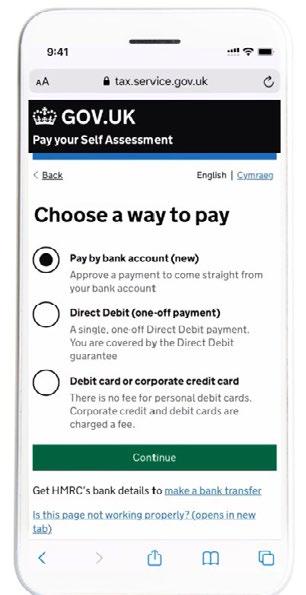
Mobile wallets are replacing leather
Consumers of all ages are rapidly adopting mobile wallets such as Apple Pay and Google Wallet for payments of all types. In fact, 45% more consumers report using a mobile wallet to make a

If you expect a customer to complete a form on your website portal which is open to their human error entering the reference number, then they can also delay the process to when it is more convenient and you have your account number and card to hand.
One in three consumers have paid a bill at the last minute, significantly up from 2021 (2022 Annual Pulse Report).
According to Openbanking.org , they estimate that 10-11% of digitally-enabled consumers and small businesses used open banking during March 2022. This figure has increased from 9-10% in March 2021.
In 2022 there were 68.2m open banking payments, up from 25.2m in 2021. Month-on-month growth is running at around 10%.
UK government is focused on growing open banking, with all organisations, local authorities and central government departments encouraged to provide open banking payment methods. HMRC offers open banking payments today through Trustly (Ecospend). This is the first embedding of open banking within a government in the world. The first tax authority to launch open banking and reap the benefits.
So, what are the benefits for enforcement to bring in Pay by Bank services?
Local Authority savings ~80% cheaper than cards
Fund settlement speed
User experience and growing adoption
Payment exceptance rates
Funds settle instantly
Seemless XD – FaceID and Pay +80% of UK population will use Pay by Bank by 2025
99.4% of consumers who initiated a purchase complete it successfully vs 85% cards
No chargebacks or fraud The strongest biometric authentication (SCA ready)
To understand the benefits in more detail, Ecospend released a case study with HMRC discussed on the 7th June at the Local Authority Revenues Innovations Conference at Chelsea Old Town Hall. Since the inception of the service, over £13.5 billion has been transacted in 18 months, live across all the major tax regimes. For HMRC, this delivered cost and efficiency savings with 100% automated reconciliation.
Resources and integration availability is always a challenge when bringing in something new to any authority. Integration and onboarding were achieved in record time with the service live within ten weeks from the
The take-off of direct to bank payments should not be ignored
So what are the obstacles for enforcement now? Enforcement operations typically offer the customer two options. The dreadful 24/7 telephone payment line option that is fast falling out of use, and online payments via the companies portal. Both methods and taking payments over the phone are fraught with potential errors and are not exactly quick. They are also expensive for the company to support.
Pay by bank changes everything with revenue officers now able to use unique QR codes printed on letters to customers, and send secure SMS messages or emails to customers where errors are removed. The customer simply uses the link that opens their banking tools when all details are completed. Seemless, frictionless and fully secure.
Reconciliation is no different as these new payments also appear within the authority’s statement. But the exciting part is that transactions can be monitored in real-time. Revenue officers can then see and act immediately when payments fail and remove the delays whilst supporting customers quicker. Better outcomes for both the customer and enforcement firm. There is little to dislike about this technology.
Daniel Pearce Director of Business Development, Telsolutions Ltd
•
•
•
•
•
Visit: newlynplc.co.uk/new-business-enquiry
Email: lappleby@newlynplc.co.uk (North) sbyrne@newlynplc.co.uk (South)
Immersive customer technology & services for process automation that includes Chatbots and now Voicebots.
Listening, learning to understand and work with customer for better outcomes and case resolution.
From the leader in debt and enforcement customer engagement services Telsolutions.
Using intuitive customer communications to enhance income and recoveries.

Adopting behaviour automation to create efficiencies & positive outcomes.
Telsolutions – Alwaysgoalittlefurther www.telsolutions.co.uk

To be the best at what we do today and in the future for our staff, clients and the community.
Follow us to see our latest official:
• press releases
• government news updates
• website blogs
...where we discuss industry topics and updates from the enforcement industry. Our regularly released blogs focus on key topics being discussed in the enforcement industry, from updates from the Ministry of Justice to Government enforcement updates and regulations.

LinkedIn:
https://www.linkedin.com/company/civil-enforcement-association-limited
Website:
https://www.civea.co.uk/ CIVEA
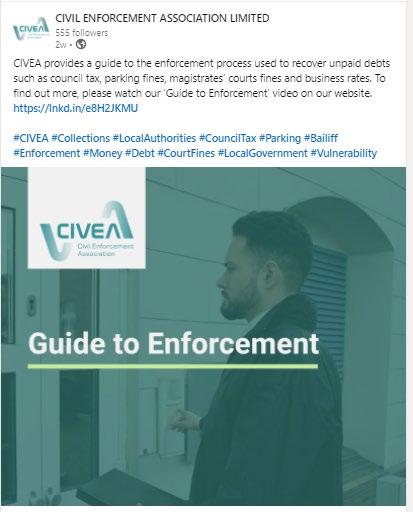
PO Box 745
WAKEFIELD WF1 9RJ
Email: admin@civea.co.uk
Telephone: 0844 893 3922
